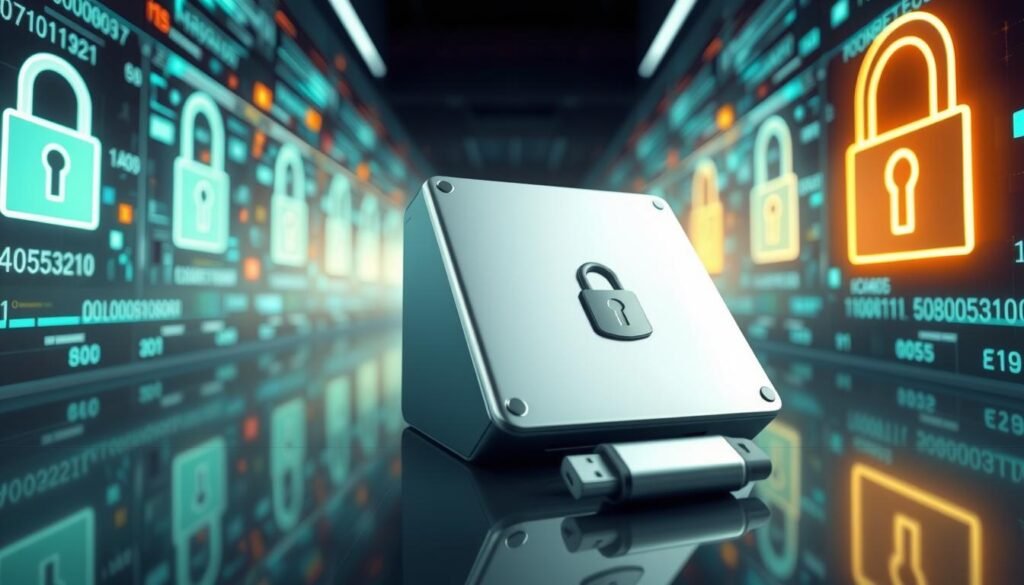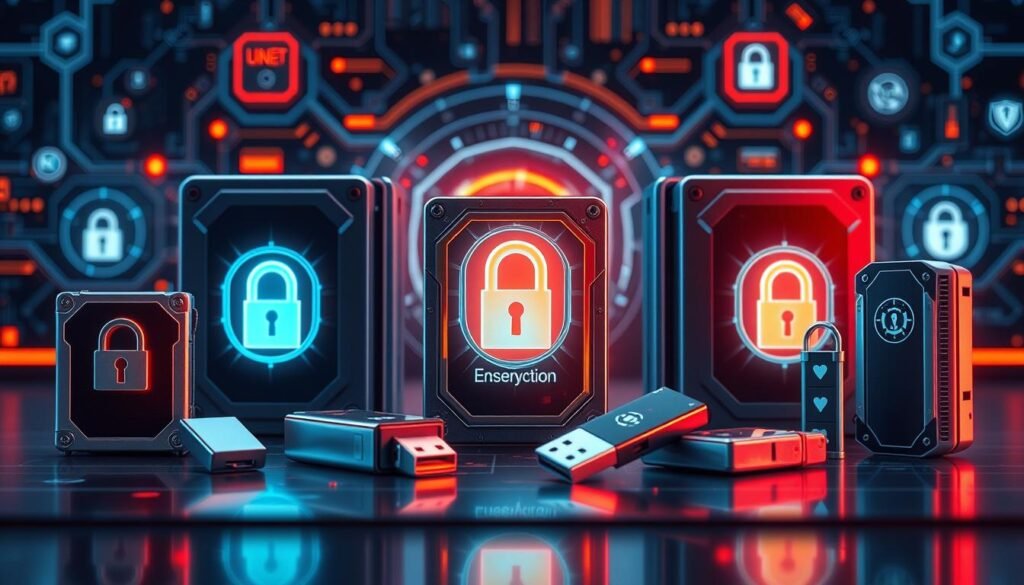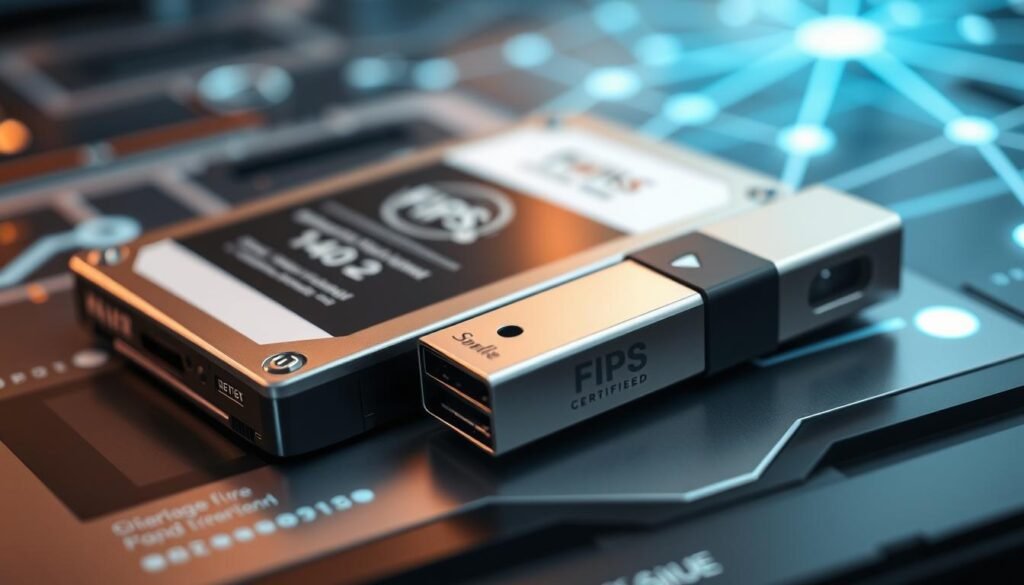
In today’s world, keeping your digital data safe is more important than ever. With data breaches on the rise, protecting your information on portable devices is crucial. A 20% increase in breaches in the first half of 2020 shows how urgent this need is.
This guide will help you understand how to keep your data safe. We’ll cover the basics of storage security, the latest encryption methods, and the best ways to protect your information. You’ll learn how to safeguard your valuable data.
Key Takeaways
- Understand the importance of data security for portable storage devices
- Explore the various types of secure storage solutions and their key features
- Learn about the latest encryption standards and hardware-based security measures
- Discover best practices for managing sensitive data on portable devices
- Gain insights into industry regulations and compliance requirements for secure data storage
Understanding Storage Device Security Fundamentals
Our use of digital data is growing fast. This makes strong storage security very important. Devices like encrypted hard drives and tamper-proof USB drives help keep our data safe. They protect it from hackers, data theft, and physical damage.
Locking Thumb Drive https://amzn.to/3BunCIO
Locking Hard Drive https://amzn.to/3OViP6h
Types of Secure Storage Solutions
There are many secure storage options available. They help keep our data safe in different ways. Here are a few:
- Hardware Encryption Drives: These devices, like self-encrypting drives, use hardware encryption. This makes data unreadable to anyone who shouldn’t see it.
- Tamper-Proof Drives: These drives have special features to stop physical tampering. They keep your data safe from being messed with.
- Encrypted USB Drives: These portable drives have hardware encryption. They’re easy to use and keep your data safe on the go.
Key Security Features and Standards
Secure storage devices meet strict security standards. For example, FIPS 140-2 checks their encryption and design. These standards help protect your data from many threats.
Common Security Vulnerabilities
Even with strong security, devices can still face risks. Threats include theft, malware, and data loss by accident. Using hardware encryption and tamper-proof features helps fight these dangers. It keeps your data safe and sound.
Comparing USB External Hard Drives and Flash Drives
USB external hard drives and flash drives are both great for storing data on the go. But they serve different needs. Knowing the differences helps you pick the best one for you.
Storage Capacity: External hard drives hold more, from hundreds of gigabytes to terabytes. They’re perfect for big backups and media collections. Flash drives, though, are smaller, ranging from a few gigabytes to hundreds. The bigger ones are pricier and less common.
Portability and Durability: Flash drives are tiny and easy to carry, fitting in pockets or on chains. They’re also tough against drops because of their solid design. External hard drives are bigger but still portable. Many don’t need a separate power source.
Data Transfer Speeds: External SSD hard drives are faster than traditional HDDs. This is great for video editing and running apps. But, they’re slower than internal SSDs.
Choosing between a USB external hard drive and a flash drive depends on your needs. External hard drives are better for lots of storage and constant use. Flash drives are ideal for their small size and durability.
| Feature | USB External Hard Drives | USB Flash Drives |
|---|---|---|
| Storage Capacity | Typically larger, ranging from hundreds of GB to several TB | Smaller, ranging from a few GB to hundreds of GB |
| Portability | Larger in size but can be portable, with some models drawing power directly from USB ports | Compact and highly portable, easily fitting in pockets or on keychains |
| Durability | More prone to physical damage from drops compared to flash drives | More resistant to physical shocks due to their solid-state design |
| Data Transfer Speeds | External SSD drives offer faster speeds, while traditional HDDs are slower | Generally slower data transfer speeds compared to external SSDs |
“Flash drives are for quick storage and easy transport. External hard drives are better for long-term use and constant access.”
Essential Features of Encrypted Storage Devices
In today’s digital world, keeping data safe is crucial. Encrypted thumb drives are a top choice for protecting important information. They use hardware encryption technology for better security than software encryption.
Hardware Encryption Technology
FIPS 140-2 certified drives use hardware encryption, known as the best for data safety. This method keeps data safe even if the device is lost or stolen. It’s fast and strong against hackers, making it great for businesses with sensitive data.
FIPS 140-2 Certification Explained
The FIPS 140-2 certification is a strict government standard for encryption. Tamper-proof drives with this certification have been thoroughly tested. They ensure the encryption is strong and the device is secure. It’s essential for any business protecting its data.
Tamper-Proof Protection Mechanisms
Secure devices have tamper-proof protection mechanisms to stop physical tampering. If someone tries to mess with the device, it can erase all data or lock it down. This extra security gives users confidence that their data is safe.
“Encrypted storage devices with hardware encryption and tamper-proof protection are the gold standard for securing sensitive data in today’s digital landscape.”
Secure Hard Drives and Thumb Drives: Best Practices
Protecting data on portable storage like hard drives and thumb drives is key. Use encrypted data protection drives for strong secure storage devices and encryption methods. These devices have hardware encryption, keeping your data safe even if lost or stolen.
It’s also important to back up data regularly. Moving data to cloud storage or external hard drives adds extra protection. Always delete data from devices after use to stop unauthorized access.
- Use encrypted storage devices with hardware-based encryption for top data security.
- Set up regular backup plans, using cloud storage or external hard drives as backup options.
- Always delete data from portable devices after use to reduce unauthorized access risks.
- Keep your device’s software and firmware updated to fix known issues.
- Install good antivirus and anti-malware software to protect your devices from threats.
Companies should create clear policies for using secure storage devices, following advice from security groups like the French ANSSI. These policies should cover device management, access controls, and data handling to protect sensitive information well.
“Proper management of removable media is crucial for safeguarding data in today’s digital landscape.”
By following these best practices, you can lower risks with portable storage. This ensures your valuable data is well-protected.
Data Protection Through Hardware Encryption
In today’s digital world, keeping sensitive data safe is key, especially for businesses. Hardware encryption is a top way to do this. It encrypts data right on the storage device before it’s stored. This strong protection keeps data safe from unauthorized access and cyber threats.
AES 256-bit Encryption Standards
The AES 256-bit encryption standard is seen as the top data security measure. It’s so strong that even the most powerful computers can’t crack it in millions of years. With AES 256-bit, businesses know their data is safe with the best encryption.
Implementing Encryption Protocols
Using strong encryption protocols is key for data safety. BitLocker, a Windows feature, is a great example. It works with hardware encryption to add extra security to USBs and external hard drives.
Key Management Systems
Good key management keeps encrypted data safe. Advanced systems let businesses manage encryption keys in one place. This ensures only authorized people can access sensitive data, which is vital in business settings.
By using hardware encryption and strong protocols, companies can protect their data from advanced cyber threats. This approach is essential for keeping sensitive information safe in our digital world.
| Feature | Kanguru Defender 2000 Secure USB Drive | Kanguru Defender HDD350 Encrypted Hard Drive |
|---|---|---|
| Encryption Standard | AES 256-bit Hardware Encryption | FIPS 197 Certified 256-bit AES Hardware Encryption in XTS Mode |
| Encryption Mode | XTS | XTS |
| Certification | FIPS 140-2 Level 3 | FIPS 140-2, FCC, CE, RoHS, WEEE |
| Interface | USB 3.1 Gen 1 | SuperSpeed USB 3.0 (USB 3.2 Gen 1×1) |
| Capacity | Up to 1TB | 2TB, 5TB |
| Read/Write Speed | Up to 400MB/s | Read: 100MB/s, Write: 70MB/s |
| Dimensions | 3.3″ x 0.6″ x 0.5″ | 5.5″ x 3.4″ x 0.79″ |
| Weight | 1.06 oz (30g) | 1.15 lbs (522g) |
| OS Compatibility | Windows, Mac, Linux | Windows 11, Windows 10, Windows 8.1, Windows 8, Windows Server 2016 or newer, Mac OS 11 or newer |
| Warranty | 3 Years | 3 Years |
“Hardware encryption provides the strongest level of protection for sensitive data, ensuring that it remains secure even in the event of physical loss or theft.”
Professional Storage Security Solutions
In today’s digital world, keeping data safe is key for all businesses. Storage devices like encrypted hard drives and data protection drives are vital. Companies can use advanced tech like SASE, CASBs, SWG, and ZTNA for strong security.
Using sandboxes is a smart way to check new devices. They test devices in a safe space before they join the network. Also, adding physical security, like marking devices and storing them safely, helps keep data safe.
| Product | Rating | Price | Key Features |
|---|---|---|---|
| Crucial X9 Pro | 4.5/5 | $98.56 | IP55 dust and water resistance, drop-proof up to 7.5 feet, 256-bit AES hardware-based encryption |
| Samsung Portable SSD T7 Shield | 4.0/5 | $108.71 | AES 256-bit hardware-based encryption, USB 3.2 Gen 2 speed, up to 2TB capacity |
| Apricorn Aegis NVX | 4.0/5 | $304.94 | AES-XTS 256-bit encryption, shockproof design, high-speed performance |
Secure storage is vital for sensitive data in many fields. This includes Government, Healthcare, Legal, Finance, Energy, and Manufacturing. These sectors use secure storage devices to protect important data and follow privacy laws.
Brands like DataLocker are trusted by over 70% of the Fortune 100. Their products, like the DataLocker Sentry K350 and DL4 FE, are known for their ease of use and strong security. They meet the needs of businesses looking to protect their data.

As the need for data protection drives grows, businesses must keep up with new tech. Using encrypted hard drives and strong security measures helps keep data safe. This also helps companies follow important regulations.
Managing Sensitive Data on Portable Devices
In today’s fast-paced business world, accessing and sharing sensitive data on the move is crucial. But, using portable devices like USB drives and external hard drives poses security risks. It’s vital to manage sensitive data on these devices well to protect important information and follow the law.
Data Classification Guidelines
First, creating clear data classification guidelines is essential. Sensitive data, like financial info, customer records, or intellectual property, needs strong security. A detailed data classification system helps identify how sensitive each type of information is. It also outlines the necessary storage and handling steps.
Access Control Measures
Good access control is crucial for keeping sensitive data safe on portable devices. This means using strong passwords, user checks, and encryption. Employees need to learn how to make secure passwords and update them often to avoid unauthorized access.
Secure Data Transfer Protocols
Secure data transfer is key when moving sensitive data with portable devices. Encryption, especially AES-256, is a must for top security. Using encrypted files, like those from WinZip or 7-zip, can also boost data security during transfer.
Managing sensitive data on portable devices well requires a mix of data classification, access control, and secure transfer. By following these steps, companies can reduce risks from portable storage and protect their valuable data.
“The failure of software compliance audits can result in fines of up to $150,000 per violation for an organization.”
Keeping strict rules and security for portable devices is not just about protecting data. It’s also about following the law and avoiding big fines. Regular training and security checks are key to keeping these practices effective.
Preventing Data Loss and Theft
In today’s digital world, keeping sensitive data safe is key. Businesses and people face big risks of losing or having their data stolen. Secure storage devices help, but a full plan is needed to really protect your data.
Backups are the first step in keeping your data safe. They make sure you can get back your files if something goes wrong. Use an automated backup to make it easier and cut down on mistakes.
Securely deleting data is also crucial. Use a good data wiping tool to make sure old devices or deleted files can’t be recovered. This stops data theft and keeps your data safe from wrong hands.
Encryption is a strong defense against unauthorized access. It makes your data unreadable to anyone without the right keys. AES-256 encryption is top-notch, keeping your data safe from even the most advanced threats.
With more people working from home, the risk of data loss and theft has grown. Encrypting all work devices can help keep your data safe, even if a device is lost or stolen.
Good data governance and access control are also key. They help limit who can see your data and watch what users do. This cuts down on the chance of unauthorized access and insider threats.
By using a mix of data loss prevention and theft protection strategies, you can keep your data safe. Secure devices, backups, encryption, and access controls are the base of a strong data security plan.
Business-Grade Security Features and Compliance
In today’s digital world, keeping data safe is a top priority for businesses. Companies must follow strict rules and security policies to protect their data. FIPS 140-2 certified drives, like the Kanguru Defender 3000™, are key in meeting these standards.
Industry Regulations and Standards
Rules like GDPR, HIPAA, Sarbanes-Oxley, and GLBA demand strong data security. The Kanguru Defender 3000™ is certified to FIPS 140-2, showing it meets these standards. This certification proves the drive’s encryption and tamper-proof features, giving businesses peace of mind.
Corporate Security Policies
Good data protection needs strict security policies. Companies must control how portable storage devices are used to avoid data leaks. FIPS 140-2 certified drives, like IronKey from Kingston, offer top security features. They have multi-password options, read-only modes, and remote management, helping IT keep data safe.
Using leading security solutions and following rules helps build trust with customers and partners. Investing in FIPS 140-2 certified drives is a smart move for data protection and compliance. It helps businesses avoid the harm of data breaches and theft.

Troubleshooting Security Issues
In today’s digital world, keeping data safe on portable devices is crucial. Issues like drives not being seen, file damage, and overheating can happen. Knowing how to fix these problems helps keep your data safe.
Data recovery is a big worry with portable devices. Using disk check tools and data recovery software helps. Also, fighting off malware is key, as these devices can spread viruses. Regular antivirus scans can catch and remove malware.
Write protection is another common problem. It stops you from changing or deleting files. Keeping devices cool also prevents overheating, which can harm your data. Fixing these issues keeps your data safe and your devices working well.
| Forensic Indicators | Description |
|---|---|
| Theft of Data | USB devices may be used for data theft purposes. |
| Prohibited Applications | Removable devices can be employed to install unauthorized applications. |
| Unlawful Data Storage | Users might use USB drives to store illegal content. |
| Encrypted Data Storage | USB devices may contain encrypted files. |
| Virus Distribution | The distribution of malware through USB devices. |
| Identity Theft | USBs may facilitate identity theft. |
| Covert Application Execution | Running applications covertly on a system may be accomplished using USBs. |
By tackling these security issues head-on, you can keep your data safe. Remember, protecting digital info is a big job. Staying alert to new threats is key to keeping your data secure.
Conclusion
Data protection is more important than ever. The rise of sensitive information and mobile storage solutions demand strong security. OWASP highlights the need to address security risks in new technologies like LLMs and Generative AI Apps.
Encryption, hardware security, and following standards like FIPS 140-2 are key. These steps help protect data from theft, malware, and system vulnerabilities. Regular audits and human checks can also boost security.
USB storage is getting faster with the USB4 standard. Future secure hard drives and thumb drives might include biometric authentication and cloud integration. This ensures data protection across devices and platforms. By adopting these innovations, we can keep our data safe and meet regulatory needs.